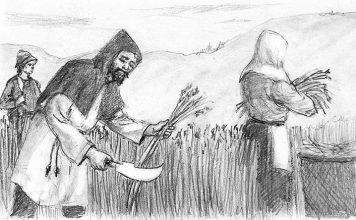| Issue #88 • July/August, 2004 |
For many of us, a job in the traditional economy is crucial to being able to maintain our chosen lifestyle. Others who are pondering a move out of the cities are hampered by economic concerns. Yet a rural lifestyle should be about practicality, flexibility, and pleasure taken in the work we choose. When approached properly, a nursing career can provide all of this and more.
To most Americans nurses are creatures that exist in hospitals and doctors’ offices, or take care of those in assisted living facilities or nursing homes. While it is true that the majority of those working in the field are found in these establishments, and thus are concentrated in the larger towns and cities, a nurse can find work nearly anywhere, particularly in this time of massive nursing shortages.
As demand increases for the small pool of practicing nurses, prospective employees are finding higher wages and greater flexibility in scheduling are par for the course. Once you have your certification, you can create your own position to a degree rarely found in the service sector, and you can do so while practicing skills that are immensely useful to yourself, your loved ones, and your entire community.
Education and types of nurses
Each state has its own Board of Nursing which sets the exact policies for local education and licensing. While most states do not recognize each other’s nursing licenses yet (we are working on this as we speak), a degree or diploma from an accredited nursing school is accepted anywhere in the country. Generally, there are two levels of nursing licensure, the Licensed Practical Nurse (LPN) or Licensed Vocational Nurse (LVN), and the Registered Nurse (RN).
The LPN/LVN licensure usually requires about a year of course work, with these programs frequently offered through junior colleges, community colleges, or vocational schools. This level of nurse is frequently employed in large facilities such as hospitals and nursing homes, though they may also be found in small doctors’ offices or in some home health situations. The LPN/LVN is a skilled provider, but has limits placed on their scope of practice (many states, for example, limit medication administration by these nurses) and thus generally commands a lower salary than the RN. Nonetheless, LVN/LPNs are in demand, and many nurses are either content to practice at this level or use it is a launching pad to RN licensure.
|
The RN is what is most commonly thought of when people speak of nurses. Traditionally, many RNs were trained in programs run by hospitals, these being three years in length and known as diploma programs. Diploma programs have been largely replaced with college-based schools of nursing which offer either a two-year Associates Degree (ADN) or a four-year Bachelors Degree (usually BS or BSN). Both types of degree enable students to take the licensure exam known as the National Council Licensure Examination (NCLEX). Upon passing this exam, students are able to obtain a license to practice as an RN.
The difference between ADN and BSN is much smaller than that between LPN/LVN and RN. Both ADN and BSN students receive the RN license, and pay scales are generally very close if not the same. A BSN is generally required for jobs focused upon independent action, such as Public Health Nurses or administration.
Nursing programs have spread across the country as demand has grown, and are increasingly found in rural areas. “Satellite Programs” attached to major nursing schools are frequently offered through rural college campuses or small local hospitals. Many programs exist that allow a nursing student to complete most coursework via the Internet, with the hands-on training taking place at the nearest hospital. With this spread of programs has come a focus upon making them practical for adults, so many schools allow part-time attendance or offer night classes. Your local community college and/or hospital will have much more information.
Areas of practice
This is where nursing becomes particularly attractive to those looking to work part-time or in rural locations. Most nurses still work at hospitals or large care facilities, but even the smallest hospitals generally offer flexible schedules to attract nurses. If you do not need benefits, nearly all hospitals will take you on with a 10-20 percent bonus to your pay as a per diem nurse. Per diem nurses can design a schedule with the needs of themselves and the hospital in mind, and choose not to work at all during other times, such as harvest or during family-focused periods. Even if benefits such as insurance are needed, many facilities will work very hard to keep staff through flexible scheduling. While you will need to adhere to your workplace’s staffing pattern (8 or 12 hour shifts, shift turnover times), you can influence strongly the days, shifts, and amount you work. An additional percentage will be added to your pay if you work evening or night shifts. Hospitals and nursing care facilities understand the nursing shortage, and should treat you like the commodity you are.
If your area has no hospital or nursing homes nearby, never fear. The range of alternative jobs is great. Schools frequently need a part-time nurse for the students, and local knowledge is always a plus. Local doctors will need help in their offices. Home care services provide nursing care to patients who need it but can not stay in the hospital indefinitely. These services offer perhaps the greatest flexibility, with you choosing your patient load and arranging visit times around your schedule.
Local and State government employ rural Public Health Nurses who help educate, track, and treat disease, and serve as local resources to the community. Many businesses employ nurses to treat their staff. Insurance companies use nurses to review cases, often at home over the Internet. Government programs present in rural areas such as WIC and Worker’s Compensation often hire nurses.
With another couple of years of education leading to a Nurse Practitioner or Nurse Midwife degree, you can establish your own practice in some states. Best of all, all of these roles put you in direct contact with your neighbors and community in a role that is appreciated and admired.
Nursing school is a large investment of time and money (though grants and scholarships abound), but the return is immense. Nursing teaches you skills that you will use to others’ benefits for as long as you live, and that will make you a valuable, contributing member of your family, church, community, and nation. Nursing allows for good pay and flexibility within your job, and a great sense of job security. After all, no matter how bad or good things get, people will always need help, and people will always need nurses.
For more information about becoming a nurse:
American Nurses Association:
600 Maryland Ave., S.W.
Suite 100 West
Washington, DC 20024
800-274-4262
http://nursingworld.org/
A directory of nursing schools:
All Star Directories, Inc.
123 N. W. 36th Street, Suite 220
Seattle, WA 98107
http://www.allnursingschools.com/
National Student Nurses Association:
45 Main Street, Suite 606
Brooklyn, NY 11201
718-210-0705
http://www.nsna.org/
National League for Nursing
61 Broadway
New York, NY 10006
800-669-1656
http://www.nln.org/















